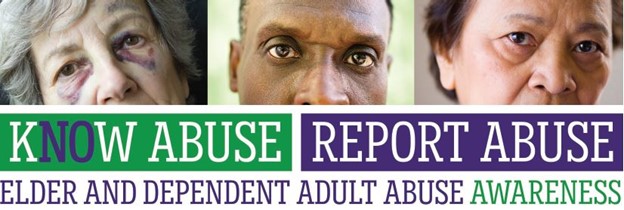The San Bernardino County Department of Aging and Adult Services-Public Guardian (DAAS-PG) is joining community and state partners in raising awareness of elder abuse in recognition of Elder and Dependent Adult Abuse Prevention Month.
Every year, thousands of at-risk adults are victims of abuse and/or neglect. As the number of older adults continues to grow, we may see more people become vulnerable to financial abuse, physical abuse or neglect. The department is taking the opportunity to educate the public and promote a better understanding of abuse and neglect of older adults and persons with disabilities. DAAS-PG’s Adult Protective Services (APS) division continues to partner with county departments and programs, community-based organizations, residents and other stakeholders to ensure the needs of this population are met.
California recognizes eight types of abuse. The following are summarized with common examples:
1) Self-Neglect – Refusal or failure to provide oneself with adequate:
- Food and water
- Clothing
- Shelter
- Personal hygiene
- Health care
2) Physical Abuse – The use of physical force that may result in bodily injury, physical pain, or impairment; or any physical injury to an adult caused by other than accidental means.
Some signs of physical abuse include:
- Bruises, black eyes, welts
- Broken bones, cuts, sprains
- Sudden change in behavior
- Caregiver refusal to leave elder or dependent adult alone
- Hitting, beating, pushing, shaking, slapping, kicking, pinching, and burning
- Unlawful, excessive or unnecessary use of force like restraints or force-feeding
- Over-medication or under-medication
3) Neglect by Others – Failure to provide the basic care, or services necessary to maintain the health and safety of an adult under one’s care when the means to do so are available.
Some signs of neglect include:
- Failure to provide adequate food, water, clothing, shelter or health care
- Dirty clothing and changes in personal hygiene
- Cluttered, filthy living environment
4) Sexual Abuse – Sexual contact with a non-consenting adult or with an adult considered incapable of consenting to a sexual act.
Some signs of sexual abuse include:
- Unexplained sexually transmitted diseases
- Unusual bruising on thighs and chest
- Unusual stains on clothing or sheets
- Unwanted sexual contact
- Sexual exploitation
- Withdrawn from social interactions; panic attacks
- Forced viewing of pornography
5) Financial Abuse – The illegal or unethical exploitation and/or use of an elder’s funds, property or other assets.
Some signs of financial abuse include:
- Unexplained/unusual purchases by the primary caregiver
- Unpaid bills, new credit cards and/or increased cash withdrawals
- Coercing or deceiving an older person into signing any document such as a contract or will
- Improper use of conservatorship, guardianship, or power of attorney
- Basic needs not being met
6) Mental Abuse – Verbal or emotional abuse includes threatening significant physical harm or threatening or causing significant emotional harm to an adult through the use of:
- Derogatory or inappropriate names, insults, profanity or ridicule
- Mental cruelty
- Inappropriate sexual comments
- Harassment
- Coercion
- Intimidation
- Threats, verbal assaults
- Humiliation
7) Abandonment – The desertion or willful forsaking by anyone having responsibility for care.
8) Isolation – Preventing the individual from receiving:
- Telephone calls (receiving or making calls)
- Visitors

Often one type of abuse leads to another. Victims often suffer from multiple forms of abuse at the hands of their abusers. For example, an older adult can be neglected by his or her family, whose only interest is control over the person’s financial assets.
Anyone who suspects an elder or dependent adult is experiencing abuse is encouraged to contact the local authorities. Additionally, it is recommended to file a report with APS by calling 1-877-565-2020. Reports of suspected abuse may be filed 24 hours a day, 7 days a week.
The goal of APS is to create a stable environment where an individual can remain safe without ongoing intervention. Services provided by APS include responding to reports of known or suspected abuse, conducting investigations, and arranging services from community agencies. APS services are provided at no-cost and on a voluntary basis.
To report suspected abuse of an elder in a nursing home, residential care facility for the elderly, or assisted living facility, contact the State CRISIS line at 1-800-231-4024 or San Bernardino County’s Long-Term Care Ombudsman Program at 909-332-6490.
For more information on DAAS-PG programs and resources available to older adults and persons with disabilities, please visit hss.sbcounty.gov/daas.
Additional County Update News – June 20, 2024
- New County Fire headquarters revealed during ribbon-cutting ceremony
- Hesperia Fire opens San Bernardino County wildfire season
- Animal Care, Office of Emergency Services, Public Health join forces to promote National Pet Preparedness Month
- Code Enforcement efforts remove 134 tons of illegally dumped waste from Adelanto
- Regional Parks secures $1M in funding for Glen Helen Regional Park improvements
- Yucaipa Regional Park hosts Summer Kick-Off event with animal presentation show, activities, food, more
- Operation Consequences June 8 through June 14
- San Bernardino County destinations
- San Bernardino County history
- Things to Do in San Bernardino County
- Pet of the Week